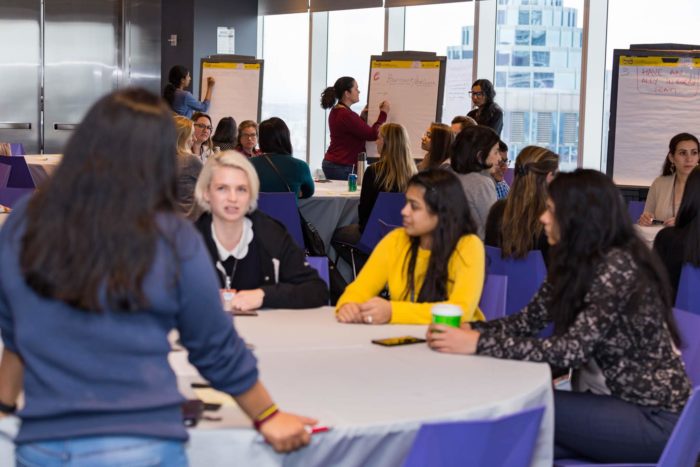Bloomberg: Encouraging Women to Pursue Technology Careers in New York City

Bloomberg: Encouraging Women to Pursue Technology Careers in New York City
Our Partner Spotlights highlight the innovative ways our Partner companies are advocating for change and equality in the tech field. Read the following piece from Bloomberg to learn more about their efforts to encourage women in New York City to enter the STEM fields.
Engineering and technology impact almost every industry. New York City houses some of the nation’s top engineering schools, positioning it well to foster the talent to drive innovation for the city’s major industries, such as finance, media, and healthcare.
Leaders in academia, business, and government across the City are collaborating to marshal a world-class effort to propel its people and business community into the future. They’ve assembled under the banner of New York City Women in Tech (NYC WIT) to cement the City as a primary technology and engineering hub by tapping women engineers, scientists, and technologists. Spearheaded by Mary C. Boyce, Dean of Columbia University’s Fu Foundation School of Engineering and Applied Science, NYC WIT includes all of the City’s top engineering schools, as well as leading businesses.
At NYC WIT’s launch event, Bloomberg News’ Janet Paskin, Workforce, Diversity and Sustainability Editor, spoke with Ursula Burns, CEO of VEON and former Xerox CEO, and Dean Boyce about why women should pursue engineering, math, or science careers. The evening was supported by NYC WIT’s corporate sponsors, including Addepar, Bloomberg, Google, Morgan Stanley, and WW. According to Dean Boyce, these companies are all committed to propelling women in technology and leadership.
NYC WIT strives to make New York City a place for girls and women who want to learn, work, start companies, and succeed in business. Increasingly, women want to be engineers in New York – 44% of undergraduates and 49% of Columbia Engineering’s entering class are women; 38% of Cornell Tech masters students are women; 32% of doctoral students at the Grove School of Engineering at The City College of New York (CUNY) are women; and nearly 40% of NYU Tandon School of Engineering’s students are women.
Plus, the City’s largest engineering schools – Columbia Engineering, NYU Tandon, and the Grove School of Engineering at CUNY-CCNY – have female deans.
“Engineering is one of the most fantastic fields to be in at this point in time with all the ways it is reshaping so many important aspects of our everyday lives,” said Dean. “It’s not just about technology, but technology’s impact, how we should be thinking about engineering and technology, and the attraction for many different people – that’s the magic New York City offers.”
“There’s a tremendous amount of opportunity in the world today – what used to be problems are now considered opportunities,” said Ursula. “Whether it’s a problem of potable water, producing food for billions or energy for the world, or developing a medical breakthrough – at the core of all of these is the application of technology to solve problems.”
The Talent Pipeline
The ability to acquire the best minds is a key to any company’s success, and companies need to support universities to ensure a large enough pipeline of qualified candidates. Since women comprise over half the world’s population, they’re a great untapped resource for technology careers – diverse teams work harder, are more productive and creative, and build better products. The pipeline starts with the City’s universities.
“We have some amazing universities across the City and we’ve started partnering in a really concerted way, recognizing that the talent coming out of our universities is part of the fuel that really feeds New York City,” said Dean.
Columbia Engineering, Cornell Tech, CUNY, NYU Tandon, and Cooper Union are all pursuing initiatives to increase the number of women in STEM programs and engineering. Barnard College, a liberal arts college for women in partnership with Columbia University, now sees STEM as a critical component of the liberal arts. Today, one-third of Barnard graduates are math or science majors. Plus, Barnard and Columbia Engineering are partnering to propel graduates to begin careers in engineering.
Collaborating with the City’s Universities
Bloomberg and other companies collaborate with the City’s universities to provide hands-on learning experiences for students.
“Bloomberg engineers visit the schools and hold events, like coding contests and technical discussions,” said Jeanette Bashford, global head of HR for engineering at Bloomberg. “They connect with students to educate them about the work being done at Bloomberg.”
Summer interns work on real-world projects alongside Bloomberg’s software engineers at the company’s global headquarters in New York, providing them with the opportunity to understand practical applications of their education, as well as experience the daily pace of an engineering career.
Depending on their performance, internships are often stepping stones for job offers after graduation, explained Jeanette. Bloomberg looks for a diverse pool of interns and strives to put forth a diverse slate of interviewers when interviewing on campus.
Diversity at Bloomberg
Organizations’ leaders set the tone that trickles down to employees. Increasing the diversity of staff is the first step. Being able to truly benefit from the innovative ideas that come from diverse teams requires companies to provide a supportive environment that allows everyone to succeed, as well as the necessary tools and visibility.
Bloomberg Engineering has established many initiatives to help attract, retain, and promote women. While the company holds training on unconscious bias and works with male allies to advocate for women, two initiatives have helped create a welcoming environment for women:
- Bloomberg Women in Technology (BWIT), a supportive grassroots community with 1,000+ members – both women and their allies – provides educational resources about technology, organizes town halls, and hosts networking opportunities with senior leadership.
- The Women in Engineering Leadership Development (WELD) program trains women to become successful leaders. Participants meet regularly with a senior leader from the department. Structured discussions focus on specific topics, like promoting yourself to advance your career or effective networking techniques. Women foster new mentor- or sponsorship-style relationships with senior leaders, which help them move ahead in their careers.
“We’re seeing positive results – the female population in Engineering has grown by 16% in the last two years,” said Shawn Edwards, Bloomberg’s CTO. “While we still have plenty of work to do, we’re committed to making our company a great place for female technologists to work and grow their careers.”

